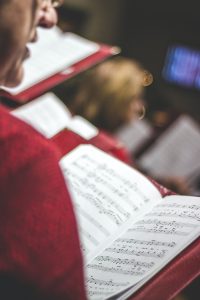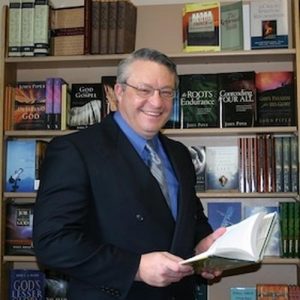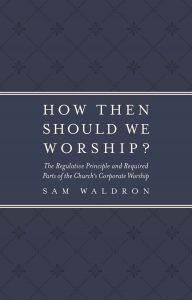14 Apr Thoughts on Reformed Worship

How should a reformed church worship? Do the scriptures speak to this? Dr. Sam Waldron tackles these questions and more in the introduction to his new release How Then Should We Worship, which we have excerpted here:
The rise of the Charismatic movement and the related contemporary worship movement unavoidably raises the question for every local church and eldership, How Then Should We Worship? This problem is particularly acute for those who have come more or less to espouse the Reformed faith and understanding of Christianity. Does this new (to us) and more deeply biblical (we believe) understanding of Christianity make any difference as to how we should worship? Unquestionably, many of those who have become a part of churches or denominations that are more strictly or comprehensively Reformed in their views have opted for what most would call a more conservative and traditional worship. But does a distinctively Reformed view of the Christian faith require a distinctively Reformed worship? The proposition is appealing and, indeed, seems irrefutable: Yes, a distinctively Reformed theology requires a distinctively Reformed worship! Can we really think that an understanding of Scripture that has revamped our understanding of Christianity will not revamp our understanding of worship?
But if Reformed theology requires Reformed worship, what does that mean? Does it simply mean a more conservative and more traditional (non-Charismatic and non-contemporary) approach to worship? And what does that mean? Are there not other approaches to worship that may be viewed as conservative and traditional that are not truly Reformed? I think there are. Terry Johnson in his instructive work entitled, Worshipping with Calvin, points out that there are several varieties of traditional and (what might be called) conservative worship that are actually centered on things that mark them as anything but Reformed. He mentions the revivalist-evangelistic model and the Bible-teaching model in the Evangelical tradition. Lutheran and Roman Catholic worship might also claim to be traditional and conservative, but these are patently non-Reformed approaches.
What is a truly Reformed worship? A reactionary preference for conservative and traditional worship (whatever that may mean to us) is not sufficient. The time has come to say that it is not enough for those who have come to (and now hold to) the Reformed faith to react into a conservative and traditional worship—whatever that may mean in the tradition with which they are familiar. It is time to answer the question, How Then Should We Worship? according to the biblical, authentic, and distinctive insights of the Reformed tradition. A biblical and Reformed theology must lead to a distinctively biblical and Reformed worship.
This being the case, it is clear that if worship is to be truly reformed and Reformed we must do more than simply dust off the Westminster Assembly’s The Directory for the Publick Worship of God. We must do more than read old, Puritan and Reformed treatments of worship. Don’t get me wrong. I think we must pay attention to the venerable advice and historical wisdom of that Reformed tradition which in so many other respects we have found to be wise and biblical. It would be foolish not to! In my new book How Then Should We Worship, I begin my treatment proper of how we should worship by taking a good long look at what we may learn from both the Early and Reformation Church. But as we shall see, the fundamental insight of the Reformed tradition is that worship must be ordered according to sola scriptura. Fundamentally, its insight is that the worship of the church must be constructed according to the principle of Scripture alone. To be specific, this means that Reformed worship must be governed by sola scriptura functioning as the regulative principle. This means that my orientation and focus in this book is on Scripture and what it has to say about the church’s worship. This means—and it is important to say it—that I approach the Scriptures with the same assumption that the Reformed tradition did. I mean the assumption that the Bible does intend to provide us with an adequate blueprint for the church and its worship. If we doubt this, we will never take the time to look as closely as we should at what it may teach us about the church’s corporate worship.

Dr. Samuel E. Waldron is Professor of Systematic Theology and the Dean of Covenant Baptist Theological Seminary. Dr. Waldron received a B.A. from Cornerstone University, completed studies equivalent to an M. Div. at Trinity Ministerial Academy, obtained a Th.M. from Grand Rapids Theological Seminary, and attained a Ph.D. from Southern Baptist Theological Seminary. From 1977 to 2001 he was one of the pastors of the Reformed Baptist Church of Grand Rapids, MI. He is now one of the pastors of Grace Reformed Baptist Church in Owensboro, KY.
How then Should We Worship sets out guidelines for a distinctively Reformed worship, according to the regulative principle of the church.


